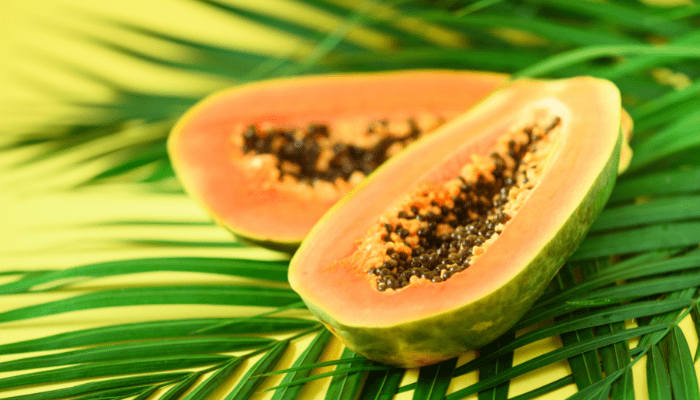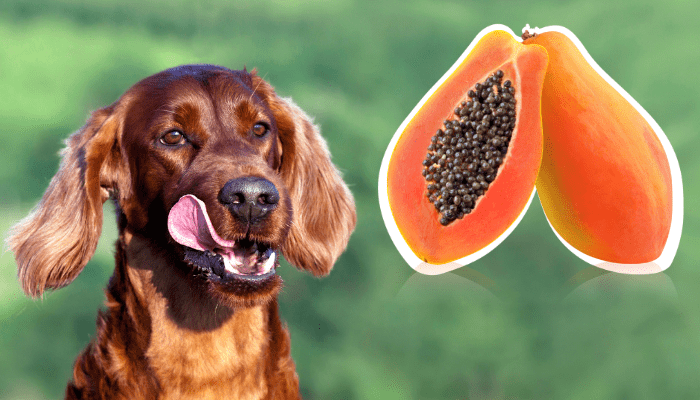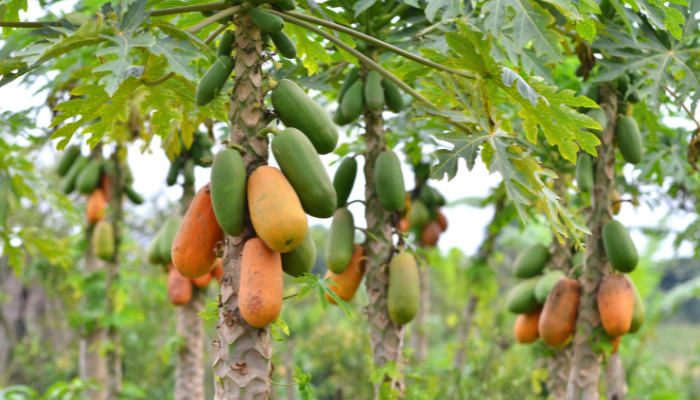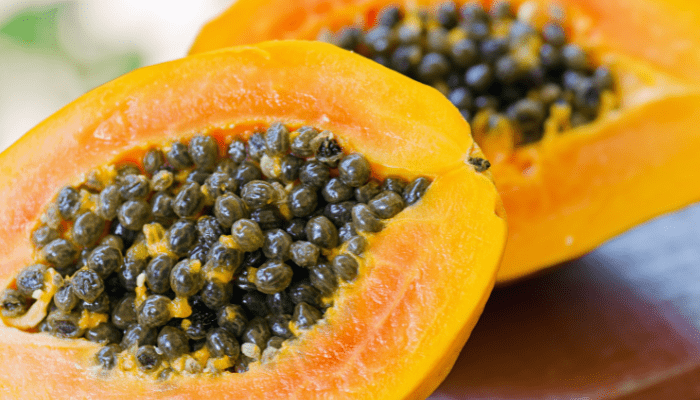Does your pup love tropical fruits? Do you want to give them a nutritious and healthy treat? Then look no further than the sweet and succulent papaya! Not only can dogs eat papaya, but this fresh fruit also provides many health benefits for your four-legged friend. Read on to learn about feeding your pup papaya and its various dog’s health benefits.
What is Papaya?
Papaya is a tropical fruit native to the Americas, specifically the Caribbean and Central and South America. However, it is also grown in other tropical and subtropical regions worldwide. Papaya trees grow quite large, reaching heights of up to 20 feet, and have large, deeply lobed leaves.
The fruit is oval or pear-shaped and ranges from about 6 inches to over a foot long. It has a thin, edible skin that is green when unripe and turns yellow or orange when ripe. The flesh of the papaya is orange or pink and has a soft, pulpy texture. There is a large central cavity in the fruit that contains seeds, which are also edible. The seeds taste slightly bitter and are often removed before eating the fruit. Papaya is known for its sweet, tropical flavor and is usually eaten fresh or used in salads, smoothies, and other dishes.

Nutritional Content of Papaya Fruit
Here is a list of some of the nutritional content of fresh papaya fruit:
- Vitamin C: Papaya is a good source of vitamin C, an important nutrient that helps support the immune system and promotes healthy skin and tissues.
- Vitamin A: Papaya is also a good source of vitamin A, which is important for vision, bone growth, and immune function.
- Folate: Papaya is a good source of folate, a B vitamin essential for cell growth and proper brain function.
- Potassium: Papaya is a good source of potassium, an important mineral for maintaining healthy blood pressure and heart function.
- Fiber: Papaya is a good source of fiber, which helps to support digestion and aid in weight management.
- Magnesium: Papaya is a good source of magnesium, an essential mineral for maintaining healthy bones and supporting muscle function.
- Copper: Papaya is also a good source of copper, a mineral that is important for maintaining healthy blood vessels, bones, and connective tissue.
It’s worth noting that the nutritional content of papaya can vary depending on factors such as the variety of the fruit, the location where it was grown, and the stage of ripeness.

Can Dogs Eat Papaya?
Yes, dogs can safely eat fresh papaya as an occasional treat! This tropical fruit is a healthy snack and a great source of vitamins and minerals, making it an excellent addition to your pup’s diet. Papaya contains vitamins A and C, magnesium, folate, and dietary fiber.
These nutrients offer a range of health benefits for your pup, from promoting strong bones and healthier skin to aiding digestion and boosting the immune system. As with any other food, moderation is key. Too much papaya may lead to weight gain or stomach upset, so limit the amount you give your dog.
Can Dogs Eat Papaya Whole?
Yes, dogs can eat papaya whole. However, cutting the fruit into small pieces is recommended so your pup can easily digest it. Additionally, remove any seeds as they are unsafe for your pet to consume and could cause digestive or other issues if swallowed. Feeding your pup papaya whole also benefits them from the fruit’s nutrients and vitamins. So go ahead and add some papaya slices to Fido’s bowl today.

Can Dogs Eat Papaya Outer Skin?
No, dogs should not eat papaya outer skin. Papaya skin contains oxalates which can cause digestive health issues such as vomiting or diarrhea if consumed in large quantities. Additionally, the fruit’s outer peel is usually covered with wax and other potentially harmful chemicals that could be toxic to your pup if ingested. To ensure your pup’s safety, permanently remove any papaya skin before offering it to Fido.
Can Dogs Eat Seeds?
It is not recommended that dogs eat seeds. Depending on the type of seed, they can contain various toxins and chemicals that could harm your pup’s health. Some sources can even cause digestive issues such as vomiting or diarrhea if eaten in large quantities. Eating large amounts of certain seeds may also lead to organ damage or other potentially deadly conditions. To ensure your pup’s safety, remove any seeds before offering them foods with grains.

Is Papaya Safe for Dogs?
Is papaya good for dogs? Yes, papaya is safe for dogs in moderation. Papaya contains vitamins A and C, fiber, and other beneficial nutrients for your pup’s health. However, removing any papaya before offering it to your dog is important. The skin can contain oxalates which could lead to digestive system issues such as vomiting or diarrhea if eaten in large quantities. Also, avoid giving too much of this tasty treat at once.
Health Benefits of Papaya for Dogs
Papaya can provide some health benefits for dogs when consumed in small amounts as a treat. Here are some potential benefits of feeding papaya to your dog:
- Digestive aid: Papaya contains digestive enzymes called dao, papain, and chymopapain, which can help break down proteins and aid digestion. The enzyme called dao can be beneficial for dogs with digestive issues or those who have trouble digesting specific proteins.
- Antioxidant support: Papaya is a good source of antioxidants, which can help to support the immune system and protect the body’s cells from damage.
- Vitamin C: As mentioned earlier, papaya is a good source of vitamin C, which can help to support the immune system and promote healthy skin and tissues.
- Skin and coat health: The papaya’s nutrients may help support healthy skin and a shiny coat in dogs.

Does Papaya Cause Side Effects?
While papaya is generally considered safe for dogs to eat in moderation as a treat, some dogs can experience side effects after consuming it. Here is a list of potential side effects of feeding papaya to your dog:
- Allergic reactions: Some dogs may be allergic to papaya and may experience symptoms such as itching, rash, hives, swelling, or difficulty breathing after consuming it. If your dog shows any allergic reaction after eating papaya, stop feeding it to them and consult your veterinarian.
- Diarrhea or vomiting: In some cases, dogs may experience digestive upset after eating papaya, including diarrhea or vomiting. This is more likely to occur if the dog consumes a large amount of papaya or is not used to eating this type of wet food.
- Pancreatitis: In rare cases, feeding dogs large amounts of papaya or other foods high in fat or plant-based enzyme can cause pancreatitis, a severe condition that affects the pancreas and can cause abdominal pain, vomiting, and other symptoms.
It’s worth noting that most dogs can safely eat small amounts of papaya as a treat without experiencing any side effects. However, it’s always a good idea to be cautious when introducing new foods to your dog’s diet and consult your veterinarian if you have any concerns.
How to Feed My Dog Papaya Fruit?
- Start with a small amount: When introducing any new food to your dog’s diet, it’s a good idea to start with a small amount to see how they tolerate it. This is especially important with papaya, as some dogs may have an allergic reaction or experience digestive upset after consuming it.
- Remove the seeds: The papaya seeds contain a slightly bitter compound that can be toxic to dogs if ingested in large amounts. Removing the seeds from the fruit before feeding it to your dog is important.
- Cut the fruit into small pieces: Cut the papaya into small, bite-sized pieces to make it easier for your dog to eat.
- Serve as a treat: Papaya should be fed to your dog as a treat, not as a replacement for their regular meals. It’s important to maintain a balanced diet for your dog and not to overfeed them on any one type of food.
- Monitor your dog’s reaction: As with any new food, it’s important to monitor your dog’s response to papaya and stop feeding it if you notice any adverse side effects.

Final Thoughts
In conclusion, papaya is a tasty and nutritious fruit that can be safely fed to dogs in moderation as a treat. It contains enzymes that aid digestion and is a good source of antioxidants, vitamin C, and other nutrients. While papaya can provide some potential health benefits for dogs, it’s essential to feed them in moderation as part of a balanced diet and to be aware of potential risks, such as allergic reactions or digestive upset. If you’re considering adding papaya to your dog’s diet, it’s a good idea to start with a small amount and monitor your dog’s reaction to it. As with any new food, it’s always a good idea to consult your veterinarian before introducing it to your dog’s diet.
Frequently Asked Questions
What happens if my dog eats papaya?
While papaya fruit can be beneficial for pets, removing the skin and seeds before giving them to your pup is essential. The skin and seeds of this fruit have been known to cause cancer in dogs and present a choking hazard. Therefore, it's best to give your pet only the flesh of the papaya, preferably in moderation, for a safe and nutritious snack.
How much papaya can a dog eat?
Feeding your pet the correct amount of calories is important to help avoid gastrointestinal problems like choking and intestinal blockages. When giving your pet food, check the recommended calories for size, age, and activity level. This will ensure that they get the proper nutrition for their needs.
Why does my dog love papaya?
Papaya is a great pet fruit due to its low sugar and fiber content. It also offers a range of other benefits, such as vitamins, enzymes, antioxidants, and dietary fiber, that can help with digestion and overall health.
Can dogs eat mango and papaya?
Yes, dogs can eat mango and papaya. However, they should be given in moderation as both fruits are high in sugar. Make sure the portion size is appropriate and offer them as treats rather than a main meal.






